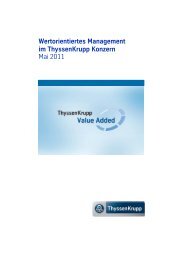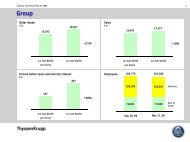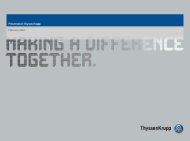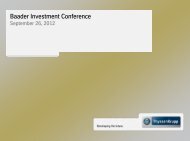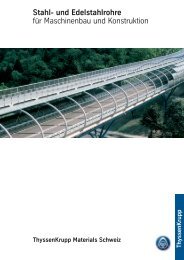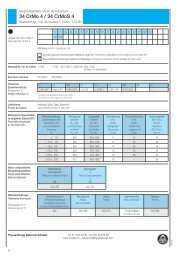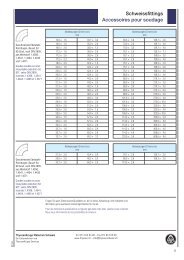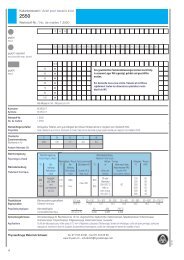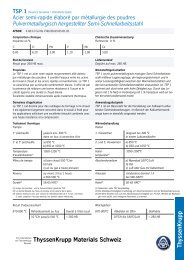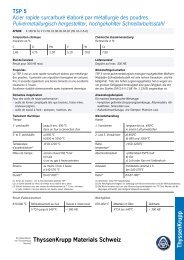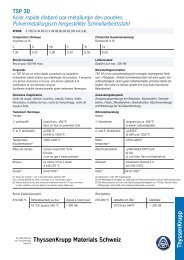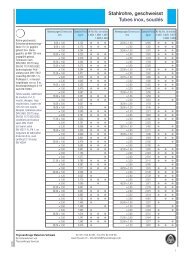ThyssenKrupp Magazin
ThyssenKrupp Magazin
ThyssenKrupp Magazin
You also want an ePaper? Increase the reach of your titles
YUMPU automatically turns print PDFs into web optimized ePapers that Google loves.
60 INTERVIEW<br />
above all, who decides what we do. Each employee within our company<br />
has to realize this and act accordingly.<br />
Is this approach part of a new corporate culture at <strong>ThyssenKrupp</strong>?<br />
Let me point out the decisive difference: in the past, engineers used to<br />
ask first of all what their competence was, and then developed a multitude<br />
of basic materials with numerous characteristics. After that, areas<br />
of application were sought for these materials. Experience shows, however,<br />
that this strategy is less successful than the reverse approach:<br />
First, customer requirements have to be researched and, based on<br />
these findings, existing competencies are combined to develop a specific<br />
solution, at justifiable expense. But I want to stress that our entrepreneurial<br />
activities have to yield a financial result that creates added<br />
value. Our modern production equipment serves above all to generate<br />
profit. Only then will we also be able to create jobs in the long term.<br />
And what about respect for the engineers’ competence?<br />
I’m not questioning their competence. But it is not only the decision<br />
makers within our Group that have to be shaken up. For decades, steel<br />
groups placed far too much emphasis on technology: engineers and<br />
technicians have a very particular mentality, and want to publish the results<br />
of their work with pride. The exchange of information in the relatively<br />
small sector thus knew no limits – everybody knew what everybody<br />
else had developed. We can no longer afford that. We are working<br />
under extremely tough competitive conditions worldwide. It is an art to<br />
remain quiet about real innovation. The most important thing is that we<br />
win customers for our innovative products.<br />
If I understand you correctly, the engineer has to be just as much a<br />
sales agent?<br />
Not necessarily, but I have to be able to expect of engineers that they<br />
never lose sight of the marketability of their innovations. In this regard,<br />
I am guided by traditional entrepreneurial principles. The product-market-profitability-responsibility<br />
relationship focuses on a very small circle<br />
of actors. This circle is rendered anonymous in major corporations. One<br />
person researches, the other produces, yet another sells, and everybody<br />
focuses only on their particular function. Real entrepreneurial interplay<br />
is often lost in the process. This has to change; we have to return<br />
to an understanding of the whole. All those in charge have to think<br />
Technology and basic materials have accompanied Prof. h.c. (CHN) Dr. Ulrich<br />
Middelmann throughout his professional life. Middelmann, 58, who has been<br />
vice chairman of <strong>ThyssenKrupp</strong> AG and chairman of <strong>ThyssenKrupp</strong> Steel AG<br />
since 2001, studied mechanical engineering in Darmstadt and economics in<br />
Aachen. He obtained a doctorate from Bochum’s Ruhr University in 1976 and<br />
an honorary professorship from the University of Tonji in Shanghai in<br />
September 2003. In 1977 he moved to Krupp Stahl AG in Bochum and in 1992<br />
became a member of the executive board of Fried. Krupp AG Hoesch-Krupp,<br />
Essen/Dortmund. In the context of the merger of Thyssen AG and Fried. Krupp<br />
AG he was appointed to the executive board of <strong>ThyssenKrupp</strong> AG in 1999.<br />
TK <strong>Magazin</strong>e | 1 | 2004 |




